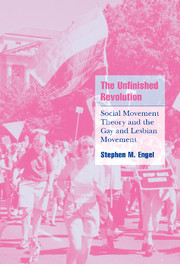Book contents
- Frontmatter
- Contents
- Notes on language
- Preface
- Introduction
- 1 Asked and answered: how questions can condition conclusions in social movement theory
- 2 Tracing the rainbow: an historical sketch of the American gay and lesbian movement
- 3 Tracing the rainbow: an historical sketch of the British gay and lesbian movement
- 4 Where and how it comes to pass: interest group interaction with political institutions
- 5 Asking the unasked question: grappling with the culture variable
- Conclusion
- Appendix: a survey of social movement theories
- Notes
- Bibliography
- Index
Appendix: a survey of social movement theories
Published online by Cambridge University Press: 31 October 2009
- Frontmatter
- Contents
- Notes on language
- Preface
- Introduction
- 1 Asked and answered: how questions can condition conclusions in social movement theory
- 2 Tracing the rainbow: an historical sketch of the American gay and lesbian movement
- 3 Tracing the rainbow: an historical sketch of the British gay and lesbian movement
- 4 Where and how it comes to pass: interest group interaction with political institutions
- 5 Asking the unasked question: grappling with the culture variable
- Conclusion
- Appendix: a survey of social movement theories
- Notes
- Bibliography
- Index
Summary
If collective behavior was the theoretical response to the socio-political climate of the 1930s, and if the RM framework was the theoretical response to the socio-political climate of the 1960s, it remains to interpret the socio-political climate of the 1990s and to reformulate social movement theory in ways which will enlighten us about this new historical moment .
Steven M. Buechler, “Beyond Resource Mobilization”To comprehend and appreciate more fully the robust quality of the political process model and the importance of multifaceted analysis, we must more carefully examine the utility and disadvantages of theories which remain confined to one evaluative sphere or to the overlap of only two such spheres. The field of social movement analysis is complex, and the language used to elucidate competing theories can be quite tangled and tricky. Therefore, as I evaluate the theories throughout this appendix, I will attempt to tie the theory with some concrete examples drawn from the civil rights movement and the gay and lesbian movement. However, before we apply these real-world examples, it might be easier to begin with a simplistic hypothetical model of collective action. Let's suggest that this particular instance of collective action is at a college campus where a group of students have mobilized in front of the administration building to protest against the distributor which supplies food to the dining hall. Perhaps the students are acting on behalf of migrant farm workers who supply produce to the distributor, but are underpaid, not offered health insurance, and are generally exploited. They may be demonstrating solidarity with university dining employees who contend that they are underpaid and subjected to poor working conditions.
- Type
- Chapter
- Information
- The Unfinished RevolutionSocial Movement Theory and the Gay and Lesbian Movement, pp. 167 - 186Publisher: Cambridge University PressPrint publication year: 2001

